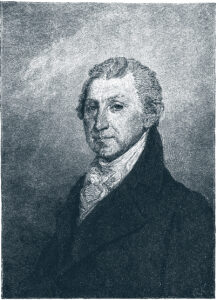 At stake was more than some Caribbean island. America itself, one elder statesman informed the president, faced a crucial test “in the great struggle between liberty and despotism.” Would the Russians and their allies be permitted to take over Latin America? Or would we stop them? The president, for the moment, kept his own counsel, but the intelligence community had made its judgment. The Caribbean was only the beginning. The general expectation, the president’s chief military adviser warned, was that Russia was plotting to employ force against South America as well. We must fight for the hemisphere’s freedom, one House leader urged the secretary of state. But the secretary of state turned out to be a dove. The Russian menace, he argued, was more an American fantasy than a political reality. He suggested that the United States pursue détente with the Russians while letting the Latin Americans work out their own problems. A sense of crisis gripped Washington. Would the president stand up for America? Or would he let aggression be its own reward?
At stake was more than some Caribbean island. America itself, one elder statesman informed the president, faced a crucial test “in the great struggle between liberty and despotism.” Would the Russians and their allies be permitted to take over Latin America? Or would we stop them? The president, for the moment, kept his own counsel, but the intelligence community had made its judgment. The Caribbean was only the beginning. The general expectation, the president’s chief military adviser warned, was that Russia was plotting to employ force against South America as well. We must fight for the hemisphere’s freedom, one House leader urged the secretary of state. But the secretary of state turned out to be a dove. The Russian menace, he argued, was more an American fantasy than a political reality. He suggested that the United States pursue détente with the Russians while letting the Latin Americans work out their own problems. A sense of crisis gripped Washington. Would the president stand up for America? Or would he let aggression be its own reward?
The year might have been 1983, the president Ronald Reagan. But it was 1823. The elder statesman was James Madison. The military adviser was John C. Calhoun. Henry Clay was the hawk in Congress; John Quincy Adams was the secretary of state. The president was James Monroe.
Over the past three years the Monroe Doctrine has enjoyed a notable revival. According to some of Reagan’s supporters, it not only empowers the president to make war in Latin America; it forbids him to make peace. Neither the president nor his supporters, it seems fair to say, sense any moral or legal contradiction between “saving” El Salvador and subverting Nicaragua—between defending the hemisphere and invading a hemispheric neighbor. For many Americans these actions embody a return to the values of a safer, surer time—the reassertion of principles going back to the Founding Fathers. Senator Jesse Helms caught this mood well when he called for reinstituting the Monroe Doctrine. “It’s time America starts acting like America again,” he declared.
Since the end of World War II a quality of the fantastic has run through the conduct of U.S. foreign policy. Successive administrations have acted out the same fantasy in Cambodia, Iran, and all over Latin America—the fantasy that invading a foreign nation can liberate it, and that imposing a government of our choice on foreign peoples can make them free. But most of all the United States has acted out a fantasy about itself—the Monroe fantasy that once upon a time, our presidents, by proclaiming doctrines, could make whole hemispheres conform to our notions of what they should be; and that if Americans only proclaim, and enforce, enough doctrines now, then the whole world will become safe for democracy.
What might Monroe and his contemporaries have made of all these doctrines? They would have denounced the Reagan Corollary not just as a threat to the liberties of others, but as a violation of American principles. They opposed such military interventions because they believed that the independence of Latin America meant freedom from “interposition” not only by the Europeans, but by us. Adams’s proudest boast was that the United States, “without a single exception, respected the independence of other nations” and “abstained from interference in the concerns of others.” But most of all Monroe and his colleagues feared what American violations of the liberties of others would do to the cause of liberty in the United States. America’s “glory is not dominion, but liberty,” Adams declared on the Fourth of July in 1821.
Two centuries after our independence from Britain, our past is to us what the monarchy has become to the British. It long ago lost the power to govern our actions, and its illusory glitter often blinds us to the realities of both the world and our place in it. But the past, if we are willing to listen, still has the power to warn.
From “The Doctrine That Never Was,” which appeared in the January 1984 issue of Harper’s Magazine.






















































































